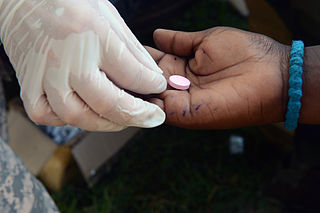
Trichuris trichiura, Trichocephalus trichiuris or whipworm, is a parasitic roundworm that causes trichuriasis when it infects a human large intestine. It is commonly known as the whipworm which refers to the shape of the worm; it looks like a whip with wider "handles" at the posterior end.

Schistosomiasis, also known as snail fever, bilharzia, and Katayama fever, is a disease caused by parasitic flatworms called schistosomes. The urinary tract or the intestines may be infected. Symptoms include abdominal pain, diarrhea, bloody stool, or blood in the urine. Those who have been infected for a long time may experience liver damage, kidney failure, infertility, or bladder cancer. In children, it may cause poor growth and learning difficulty.

An intestinal parasite infection is a condition in which a parasite infects the gastro-intestinal tract of humans and other animals. Such parasites can live anywhere in the body, but most prefer the intestinal wall.
Tropical diseases are diseases that are prevalent in or unique to tropical and subtropical regions. The diseases are less prevalent in temperate climates, due in part to the occurrence of a cold season, which controls the insect population by forcing hibernation. However, many were present in northern Europe and northern America in the 17th and 18th centuries before modern understanding of disease causation. The initial impetus for tropical medicine was to protect the health of colonial settlers, notably in India under the British Raj. Insects such as mosquitoes and flies are by far the most common disease carrier, or vector. These insects may carry a parasite, bacterium or virus that is infectious to humans and animals. Most often disease is transmitted by an insect bite, which causes transmission of the infectious agent through subcutaneous blood exchange. Vaccines are not available for most of the diseases listed here, and many do not have cures.

Helminthiasis, also known as worm infection, is any macroparasitic disease of humans and other animals in which a part of the body is infected with parasitic worms, known as helminths. There are numerous species of these parasites, which are broadly classified into tapeworms, flukes, and roundworms. They often live in the gastrointestinal tract of their hosts, but they may also burrow into other organs, where they induce physiological damage.

Tropical medicine is an interdisciplinary branch of medicine that deals with health issues that occur uniquely, are more widespread, or are more difficult to control in tropical and subtropical regions.

Theodor Maximilian Bilharz was a German physician who made pioneering discoveries in the field of parasitology. His contributions led to the foundation of tropical medicine. He is best remembered as the discoverer of the blood fluke Schistosoma haematobium, the causative parasite of bloody urine (haematuria) known since ancient times in Egypt. The parasite, as the cause of bladder cancer, is declared by the International Agency for Research on Cancer as Group 1 carcinogen. The infection is known by an eponymous term bilharzia or bilharziasis, as well as by schistosomiasis.

Neglected tropical diseases (NTDs) are a diverse group of tropical infections that are common in low-income populations in developing regions of Africa, Asia, and the Americas. They are caused by a variety of pathogens, such as viruses, bacteria, protozoa, and parasitic worms (helminths). These diseases are contrasted with the "big three" infectious diseases, which generally receive greater treatment and research funding. In sub-Saharan Africa, the effect of neglected tropical diseases as a group is comparable to that of malaria and tuberculosis. NTD co-infection can also make HIV/AIDS and tuberculosis more deadly.

Peter Jay Hotez is an American scientist, pediatrician, and advocate in the fields of global health, vaccinology, and neglected tropical disease control. He serves as founding dean of the National School of Tropical Medicine, Professor of Pediatrics and Molecular Virology & Microbiology at Baylor College of Medicine, where he is also Director of the Texas Children's Hospital Center for Vaccine Development and Endowed Chair in Tropical Pediatrics, and University Professor of Biology at Baylor College of Medicine.
Jean-François Rossignol is a French scientist, a medicinal chemist and a physician, born in France on September 5, 1943. He was educated at the University of Paris, later specializing in tropical medicine. He then pursued a career in academia and in the pharmaceutical industry discovering and developing new drugs for the treatment of parasitic diseases such as halofantrine in the treatment of multidrug resistant Falciparum malaria or albendazole and nitazoxanide for the treatment of intestinal protozoan and helminthic infections. In 1993, he co-created his own pharmaceutical company, Romark Laboratories, L.C., to develop his own invention nitazoxanide, the first of the thiazolides. At Romark, he is the Chairman of the Board of Directors of the company and its Chief Science Officer. Following the discovery of the antiviral activity of the thiazolides Rossignol went to Stanford University in California to study interferon stimulated gene pathways and chronic viral hepatitis under Prof. Emmet Keeffe and Prof. Jeffery Glenn. It was in the Glenn laboratory that the mechanism of antiviral activity of nitazoxanide against the hepatitis C virus was discovered.

Unlimit Health is an international organisation working to end parasitic disease. The organisation partners with affected countries, sharing evidence and expertise to eliminate preventable infections, through technical and financial support to ministries of health, in line with their strategies and plans, to strengthen health systems within affected communities.

Soil-transmitted helminthiasis is a type of worm infection (helminthiasis) caused by different species of roundworms. It is caused specifically by those worms which are transmitted through soil contaminated with faecal matter and are therefore called soil-transmitted helminths. Three types of soil-transmitted helminthiasis can be distinguished: ascariasis, hookworm infection and whipworm infection. These three types of infection are therefore caused by the large roundworm A. lumbricoides, the hookworms Necator americanus or Ancylostoma duodenale and by the whipworm Trichuris trichiura.
The London Declaration on Neglected Tropical Diseases was a collaborative disease eradication programme launched on 30 January 2012 in London. It was inspired by the World Health Organization roadmap to eradicate or prevent transmission for neglected tropical diseases by the year 2020. Officials from WHO, the World Bank, the Bill & Melinda Gates Foundation, the world's 13 leading pharmaceutical companies, and government representatives from US, UK, United Arab Emirates, Bangladesh, Brazil, Mozambique and Tanzania participated in a joint meeting at the Royal College of Physicians to launch this project. The meeting was spearheaded by Margaret Chan, Director-General of WHO, and Bill Gates, Co-Chair of the Bill & Melinda Gates Foundation.
Mwele Ntuli Malecela was a Tanzanian civil servant who was a senior United Nations official and the director of the Department of Control of Neglected Tropical Diseases at the World Health Organization Headquarters in Geneva, Switzerland.

Mass deworming, is one of the preventive chemotherapy tools, used to treat large numbers of people, particularly children, for worm infections notably soil-transmitted helminthiasis, and schistosomiasis in areas with a high prevalence of these conditions. It involves treating everyone – often all children who attend schools, using existing infrastructure to save money – rather than testing first and then only treating selectively. Serious side effects have not been reported when administering the medication to those without worms, and testing for the infection is many times more expensive than treating it. Therefore, for the same amount of money, mass deworming can treat more people more cost-effectively than selective deworming. Mass deworming is one example of mass drug administration.

Trematodiasis is a group of parasitic infections due different species of flukes, the trematodes. Symptoms can range from mild to severe depending on the species, number and location of trematodes in the infected organism. Symptoms depend on type of trematode present, and include chest and abdominal pain, high temperature, digestion issues, cough and shortness of breath, diarrhoea and change in appetite.
Neglected tropical diseases in India are a group of bacterial, parasitic, viral, and fungal infections that are common in low income countries but receive little funding to address them. Neglected tropical diseases are common in India.

David Hurst Molyneux CMG is a British parasitologist who served as the Director of the Liverpool School of Tropical Medicine (1991–2000), where, as of 2018, he is an emeritus professor. He previously held the Chair of Biological Sciences at the University of Salford (1977–91), where he also served as Dean of the Faculty of Science. His research and advocacy have focused on what are now known as neglected tropical diseases, and Michael Barrett credits him as among the earliest advocates of the campaign to focus international attention on this group of diseases in the early-to-mid 2000s.

John Russell Stothard is a British scientist, professor of parasitology at Liverpool School of Tropical Medicine, and well known for his teaching and research into schistosomiasis and neglected tropical diseases. He was the recipient of the Bicentenary Medal of the Linnean Society of London in 2004, and the C.A. Wright Memorial Medal of the British Society for Parasitology in 2019. He has previously held positions at London's Natural History Museum, London School of Hygiene and Tropical Medicine, and at Imperial College London between 1992 and 2010.

Gastropod-borne parasitic diseases (GPDs) are a group of infectious diseases that require a gastropod species to serve as an intermediate host for a parasitic organism that can infect humans upon ingesting the parasite or coming into contact with contaminated water sources. These diseases can cause a range of symptoms, from mild discomfort to severe, life-threatening conditions, with them being prevalent in many parts of the world, particularly in developing regions. Preventive measures such as proper sanitation and hygiene practices, avoiding contact with infected gastropods and cooking or boiling food properly can help to reduce the risk of these diseases.














